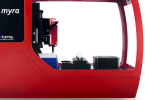Robotic Process Automation, or RPA, is a term that’s rapidly gaining traction. Consultancies like Flobotics are finding their services in high demand, from businesses large and small. But what is RPA? Put simply, it’s a family of technologies that use software to emulate – and ultimately replace – work that has historically been performed by human beings.
A software robot is able to interact with a computer system in the same way as a human worker might be able to. They can extract information from the display, enter keystrokes and move and click the mouse cursor. In theory, therefore, they can do anything that a human being can do when interacting with a computer, it’s just a matter of providing the right intelligence.
Why is RPA such a big deal?
This kind of software confers several distinct and significant advantages over traditional workers.
For one thing, RPA can drastically reduce the rate of errors. For another, it will hugely increase the amount of work that can be done. Work that would take a human being hours to perform, like sifting through a pile of two-hundred job applicants, can be done far quicker with the help of RPA. The managing director of Deloitte, David Schatsky, cites a bank that added the equivalent of 200 full-time employees for around 30% of the cost of recruiting more staff.
Given that an RPA can be implemented anywhere human beings can interact with computers, they don’t impose any of the costs associated with adaptation. Thus, ailing ‘legacy’ systems can slowly implement RPA systems over time.
Robotic Process Automation is, in practice, taking over little bits of a given employee’s workflow, taking burdensome administrative tasks away, and leaving more work-hours free for those parts of the job that really do require human involvement. Schatsky characterises this as a shift away from ‘low-value tasks’.
What are the downsides?
While RPAs are compatible with a wide range of systems, in practice they tend to fare better when scaling has been fully and properly thought out. RPA’s status as a perceived ‘quick fix’ might also cause management to lose sight of other efficiency gains that might be achievable only through an overhaul of the entire system.
RPA isn’t a good fit for every circumstance, either. Certain activities, like invoicing, confer a high degree of risk, and thus errors can be costly. Moreover, if you intend to make big changes to your IT systems in the future, you might find that the effect on your RPA robots is disruptive.
Will RPA cause unemployment?
This isn’t the first wave of mechanisation to wash over the workforce. Predictions of mass unemployment were not realised when tractors and combine harvesters were brought into agriculture, nor when mechanical looms were introduced into the textile industry.
According to a recent report by the UN, it’s reasonable to suspect that the introduction of RPA, and of AI more broadly, will not result in mass unemployment. This is so for a number of reasons. AI-driven RPA tends to have a very narrow skillset. They can do one thing very well, but lack the general intelligence necessary to apply those skills to a modern workplace.
Moreover, the introduction of RPA will create new jobs, as well as dispensing with old ones. The new jobs will also tend to involve more creativity and fulfilment, while the old ones will usually be the tedious and time-consuming jobs. You can think of an RPA narrowing down the field of potential job applicants to a shortlist, according to simple criteria like whether the person in question has the relevant background and qualifications, only for a human being to make the ultimate decision. This is a little bit like the filters you might use to narrow down options in an online store.







